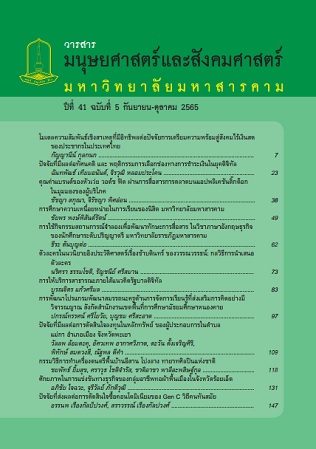การให้บริการสาธารณะภายใต้แนวคิดรัฐบาลดิจิทัล
Main Article Content
บทคัดย่อ
บทความนี้มีวัตถุประสงค์เพื่อทำความเข้าใจแนวคิดรัฐบาลดิจิทัล และการพัฒนารัฐบาลดิจิทัลเพื่อขับเคลื่อนการบริการสาธารณะของไทย เทคโนโลยีดิจิทัลคือระบบปฏิบัติการที่ใช้ประโยชน์จากเทคโนโลยีสารสนเทศและเชื่อมโยงกับสัญญาณอินเทอร์เน็ต รัฐบาลไทยมีการดำเนินงานอย่างชัดเจนภายใต้พระราชบัญญัติการบริหารงานและการให้บริการภาครัฐผ่านระบบดิจิทัล พ.ศ. 2562 โดยเทคโนโลยีดิจิทัลที่นำมาใช้ในหน่วยงานภาครัฐ เช่น Mobile Application, Cloud Computing, Big Data ประโยชน์ของเทคโนโลยีดิจิทัลทำให้ภาครัฐเพิ่มขีดความสามารถในการทำงาน ยกระดับการให้บริการสาธารณะที่มีประสิทธิภาพ สะดวก รวดเร็ว ทันสมัยมากขึ้น ทั้งนี้การพัฒนารัฐบาลดิจิทัลต้องทำควบคู่กับการยกระดับโครงสร้างดิจิทัล วัฒนธรรมดิจิทัล และที่สำคัญคือรัฐต้องระวังการเกิดช่องว่างดิจิทัล ทั้งหมดล้วนสำคัญในการพัฒนารัฐบาลดิจิทัลเพื่อนำไปสู่การทำงานบริการสาธารณะสมัยใหม่ที่มีศักยภาพ สามารถยกระดับคุณภาพชีวิตของประชาชนและพัฒนาประเทศให้เจริญก้าวหน้า
Article Details
เอกสารอ้างอิง
สำนักงานคณะกรรมการพัฒนาระบบราชการ. (2556). แผนยุทธศาสตร์การพัฒนาระบบราชการไทย พ.ศ. 2556-2561 การยกระดับองค์การสู่ความเป็นเลิศ.กรุงเทพฯ.
สำนักงานพัฒนารัฐบาลดิจิทัล (องค์การมหาชน). (2562).ร่างแผนพัฒนารัฐบาลดิจิทัลของประเทศไทย พ.ศ. 2563-2565. กรุงเทพฯ .
Denhardt, Robert. B. (2008). Theory of Public Organization. (5th ed). USA: Thompson Wadsworth.
Kester Isaac-Henry,Chris Painter,Chris Barnes.(1997). Management in the Public Sector Challence and Change. (2nd ed). Alden Press. Oxford. United Kingdom.
Limba, Tabas. (2007). Implementation of electronic governance: The case study of society interaction with public administration in Lithuania. Transformations in
Business and Economics 6, no.2 (12), Supplement A: (pp. 235-249).
National Performance Review. (1993). From red tape to results: Creating a government that works better and costs less, and reengineering through information
technology (accompanying report of the NPR). Washington, DC. US Government Printing Office.
OECD. (2014), Recommendation of the Council on Digital Government Strategies, Source http://www.oecd.org/gov/digital-government/Recommendation-digital-
government-strategies.pdf. (Accessed March 27, 2020).
Ølnes, S., Ubacht, J., & Janssen, M. (2017). Blockchain in government: Benefits and implications of distributed ledger technology for information sharing. Government Information Quarterly, 1(34), 355-364.
United Nation. (2008). UN e-government survey 2008: From e-government to connected governance. New York: Author.
Willmer, A., Duhan, J., & Gibson, L. (2017). The new machinery of government. Robotic Process Automation in the Public Sector. Deloitte
Yildiz, Mete. (2004). Peeking into the black box of e-government policy-making: The case of Turkey. PhD. Diss., Indiana University, Bloomington.


